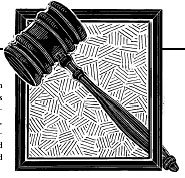From the Dean
In committee veritas
By John C. Baldwin, M.D.
A medical school, like any academic institution, has many committees. Much good work comes from the committees at DMS—provocative questions, thoughtful reflection, hard decisions. At any medical school, however, two committees stand out in importance and impact. Their work is demanding and agonizing, and the results of that work define and perpetuate the school's very heart and soul.

|
|
At any medical school, two committees stand out in importance
and impact. They perpetuate the school's very heart and soul. |
The first such committee is the one that decides on faculty appointments and promotions. These actions ultimately create the identity of the school, because, in its purest sense, an academic institution is its faculty.
The second is the committee that oversees admissions. Not only does the caliber of the student body also help to forge the identity of a school, but it affects the caliber of the faculty who can be recruited. In addition, the Admissions Committee bears the awesome responsibility of determining who will be the doctors of the future.
Healthy tensions: We are very fortunate that DMS is able to attract an extraordinarily talented group of students. The process by which that happens involves some tensions—very healthy tensions. Some members of the Admissions Committee are most interested in applicants' scientific aptitude—their ability to perform rigorous basic or clinical research that will contribute to the body of knowledge in the life sciences. That is entirely appropriate at a school like Dartmouth, which has nationally prominent research programs in many disciplines and ranks in the 87th percentile nationally in terms of National Institutes of Health funding per basic science faculty member. However, other members of the committee argue first and foremost for applicants who embody the humanistic qualities that a good clinician must have. And that emphasis is appropriate, too, for medicine must attract people who are sensitive to cultural and personal issues, who want to be good doctors in order to help people stay well and, when they become sick, get well.
In fact, the advocates on both sides of that dialectic are right. Everyone accepted to DMS should be compassionate, altruistic, respectful of patients, sensitive to patients' needs. But everyone should also have an understanding of what science really means, whether it involves working on molecular biology at the lab bench or reflecting critically on your last hundred bypass operations. Good intentions, though necessary, are insufficient to being a good doctor.
In addition, I believe that everyone we admit should enjoy teaching. A place like Dartmouth must generate physicians who are good communicators and who feel enough passion about their work to want to share it with others. For some, this may involve actual classroom teaching. For others, it may involve passing on the precepts of clinical practice or of scientific inquiry to students or residents or fellows. For still others, teaching will involve educating patients or other physicians. However it happens, teaching helps to foster the constant self-renewal and evaluation that must pervade medicine.
At DMS, we want to educate not just one kind of doctor but a whole range: some who are pure basic scientists but who understand the clinical import of what they're investigating; some who are at the interface of translational research, bringing basic science discoveries into the clinic; some who are good clinicians but are also scientists in the sense that they contribute insights to their field based on observation and experience.
Rigor: How do we ensure that those admitted to Dartmouth embody these characteristics? The Admissions Committee has historically done a magnificent job of balancing all these tensions. Some relatively new initiatives will, we hope, bring added rigor and more informed feedback to the process in the future.
The first is an assessment project being conducted by Dartmouth's Center for Educational Outcomes. Researchers there are using interactive videos about clinical situations to measure the skills of medical students at 15 schools nationwide, including DMS. This is a fascinating project, because the traditional multiple-choice exam to measure physician competence is manifestly inadequate. Effectiveness as a doctor involves much more than just knowing the facts of physiology and pathology. It involves the ability to talk with the patient and the patient's family; it involves interactions with other physicians, with nurses, with pharmacists; it involves working effectively with hospital administrators, social workers, the clergy, sometimes even the police. This project is helping physicians-to-be see how they are perceived by all these other parties. And the knowledge we gain can then be incorporated in the admissions process.
Learning: In addition, we are trying to learn from the happily rare instances in which a student is not successful at DMS. When that happens, we now look back at the admissions process, with appropriate confidentiality protections, to see how the wrong decision was made. I think it is terribly important to do that—to try to learn from our occasional mistakes. We may be able to identify something we could have done differently to save this person from the negative experience of being in a program that turned out not to be a good fit.
The Admissions Committee, a vital cauldron, is thus both measuring and learning—embodying the very attributes it is seeking in potential students. The future is in good hands.
John Baldwin is dean of DMS and vice president for health affairs of Dartmouth College.
